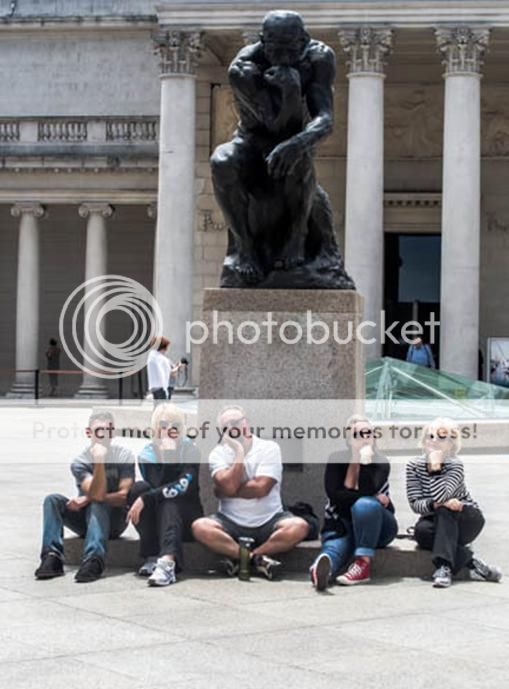“Humans differ from animals by the way they think. Humans differ from each other by what they think about.”
In the courtyard of the Legion of Honor Museum, there is a large sculpture of August Rodin’s The Thinker. On our last visit to the museum, we saw the “Impressionists on the Water” exhibit—a very compact show that features beautiful art by the artists who lived close to the waterways in France at the end of the 19th to the early 20th century, and who became known as impressionists because of the specific way they created their art. It was interesting to see how the curator put together a collection where most of the images had an unusual composition (at least from my photographic eye).
On the way out, I photographed a group of visitors who posed in the front of the sculpture, pretending to show how they think. A friend of mine, Greg Durrett, told me that when he lived close to the museum, he would go there regularly to photograph the “pretending” thinkers.
Earl Nightingale once remarked, “We become what we think about most of the time”.
What we think about is often affected by the world we live in and of course our own personal disposition. We were recently at a friend’s house where a group of men and women discussed the “hot topics” of the day–the Asiana Flight 214 crash in San Francisco and the George Zimmerman trial. Everyone had their own opinion about those stories, but the reference was primarily based on what people read in the newspapers or saw on TV. At the same time, someone commented that one cannot believe everything they read in the newspapers.
Unfortunately, those are the sources which affect our thinking about economic or political decisions as well. When Congress passed the Dodd-Frank Act in 2010, there was an overreaction to the events, which at the time were ‘old news’. The purpose of the act was to try to prevent the same type of economic disasters from happening again. The problem was that creating a document over one thousand pages long, and further attempting to implement it, was given to people whose thinking was affected by what happened in the past without any idea how to take care of the future.
The result is regulatory overkill. Since the problems were caused by the actions of the Wall Street firms and large commercial banks, regulation of the loan origination side of the mortgage industry is over-productive. What borrowers need is not protection from phantom predators, but rather solutions on how to make their lives better. In the mortgage business, it is relatively simple to accomplish. Just follow the rules of the 5 C’s that I wrote about in “The Mortgage Game: The 5 C’s and How to Connect Them”. Plus add one more “C”— Common Sense, and many problems will disappear. Unfortunately, this might lead to an increase of unemployment since no one really needs regulators to tell us how to live our lives and conduct our businesses; unless of course, those people are trained to be productive. According to the Bureau of Labor Statistics, There are 3.8 million unfilled employment opportunities in the United States. But removing regulators will increase employment for those who really want to work for a living, such as developers, builders, and anyone involved in real estate related activities and this will turn the world around. (But this might also increase interest rates. Be careful what you wish for.)
P.S.
We are closing more sales transactions. Every case has its own set of complications. In one of them, I was very pleased when the clients listened to my advice and offered a higher price. Luckily, their offer was accepted. They kept their monthly payments “affordable” by choosing a loan with a fixed rate for 7 years (not 30), and interest rate 3.75%.
P.P.S.
I also live by the water and thought that we do not have the same quality of light. As it is in the South of France, I humbly present you some of my images related to the subject.
Do not keep me as a secret.
SMILE AND PLEASE SHARE IT WITH A FRIEND





